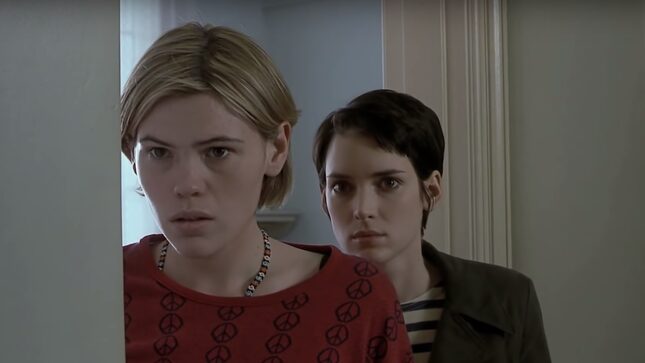Girl, Interrupted: Wages for Housework and the Refusal to Be Productive
Girl, Interrupted is an iconic, cult-classic, highly problematic representation of girls losing their minds but finding each other’s.
EntertainmentMovies
Screenshot: Girl, Interrupted
Indulge is a word that comes up a lot in and around the movie Girl, Interrupted. When the protagonist, Susanna Kaysen, meets for the first time with the head psychiatrist at Claymoore, the psychiatric facility she’s committed to, Dr. Wick tells Kaysen her “progress has plateaued.” Played brilliantly by Vanessa Redgrave, sitting calmly in a sweater set that’s a shade of yellow too muted to evoke happiness, Dr. Wick continues, “Does that disappoint you?” “I’m ambivalent,” Kaysen bites back. (She, too, is played brilliantly by Winona Ryder: unmoving eyes, mouth in a disapproving half-snarl, taut posture but for her limp, cigarette-holding hand.) Kaysen equates ambivalence with not caring, but Dr. Wick corrects her: it means to care immensely, caught between two poles. “It’s a very big question you’re faced with,” she explains. “How much will you indulge in your flaws? What are your flaws? Are they flaws? If you embrace them, will you commit yourself to a hospital for life?”
Girl, Interrupted is an iconic, cult-classic, highly problematic representation of girls losing their minds but finding each other’s in a psych ward set in the ’60s. It premiered 20 years ago in December to a mixed reception. In a mildly sexist review of the film published upon its release, the New York Times critic Stephen Holden called it a “small, intense period piece with a hardheaded tough-love attitude toward lazy, self-indulgent little girls flirting with madness: You can drive yourself crazy, or you can get over it.” It sounds worse than it is, though, coming from him—he’s actually paraphrasing a line from Whoopi Goldberg’s character, Valerie, a Black nurse frequently taunted by racist comments from the white girls she looks after on the ward. After such an incident, she tells Susanna, “You are a lazy, self-indulgent little girl who is driving herself crazy.’’ And she’s right. In Girl, Interrupted, there’s a seeming divide between the girls who are actually “crazy,” and the girls who are just flirting with madness—choosing it, even, over their other imagined options, which feel to them impossibly suffocating in their conformism.
-

-

-

-

-

-

-

-

-

-

-

-

-

-

-

-

-

-

-

-

-

-

-

-

-

-

-

-

-

-

-

-

-

-

-

-

-

-

-

-








































